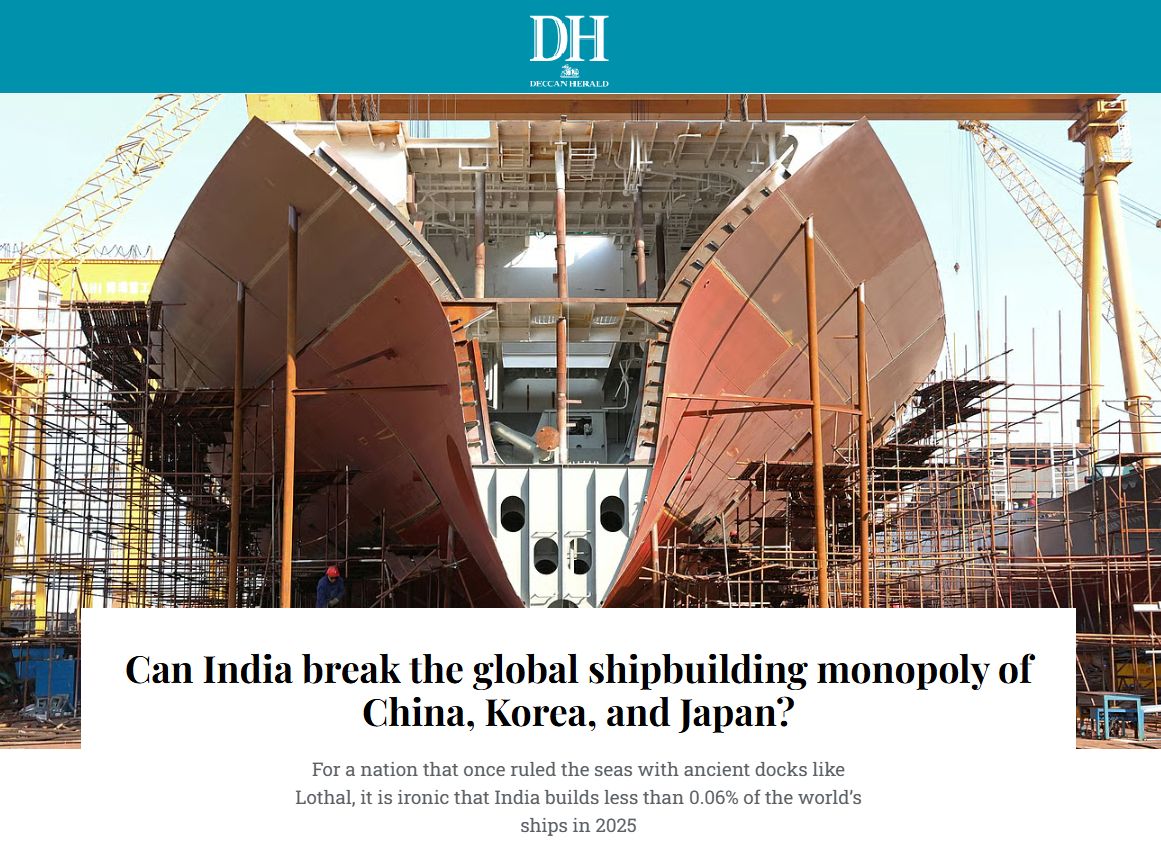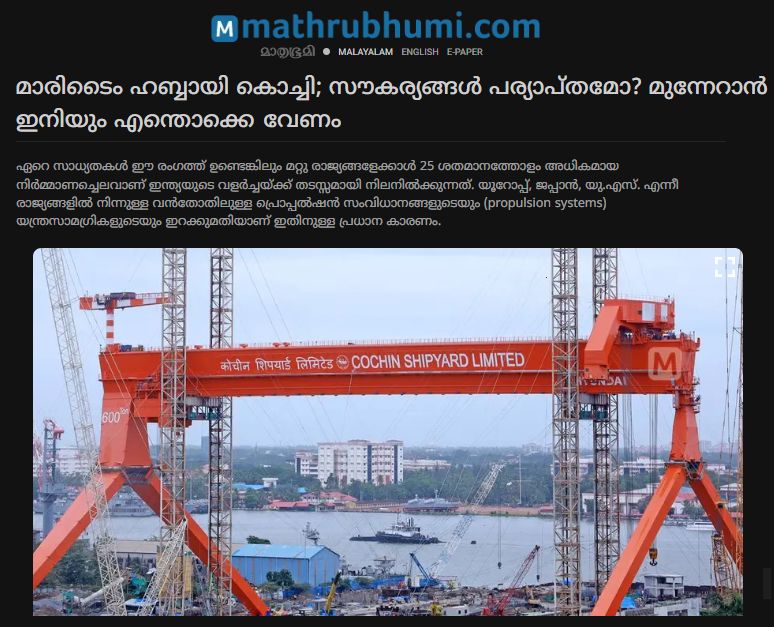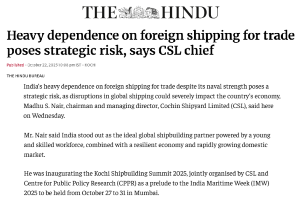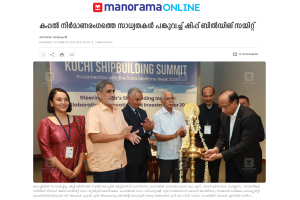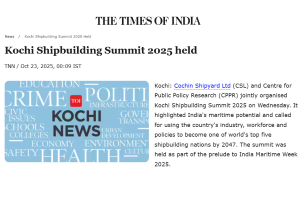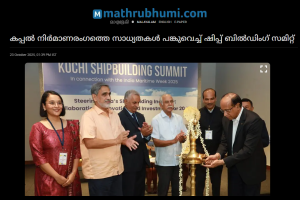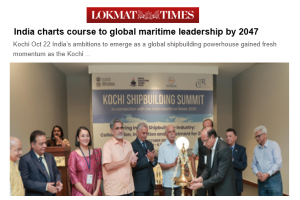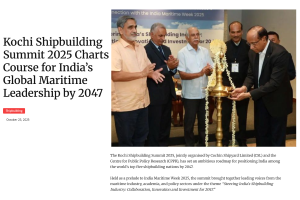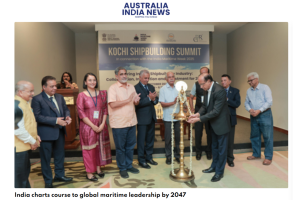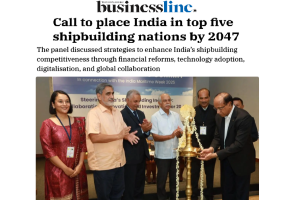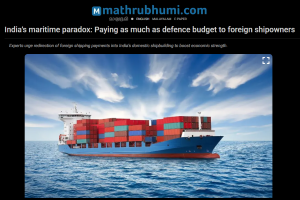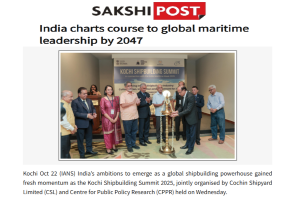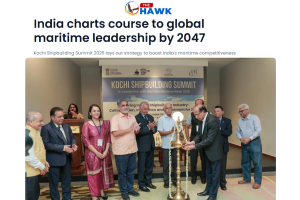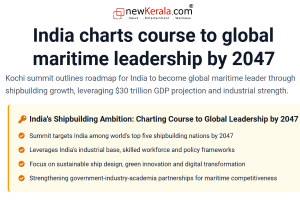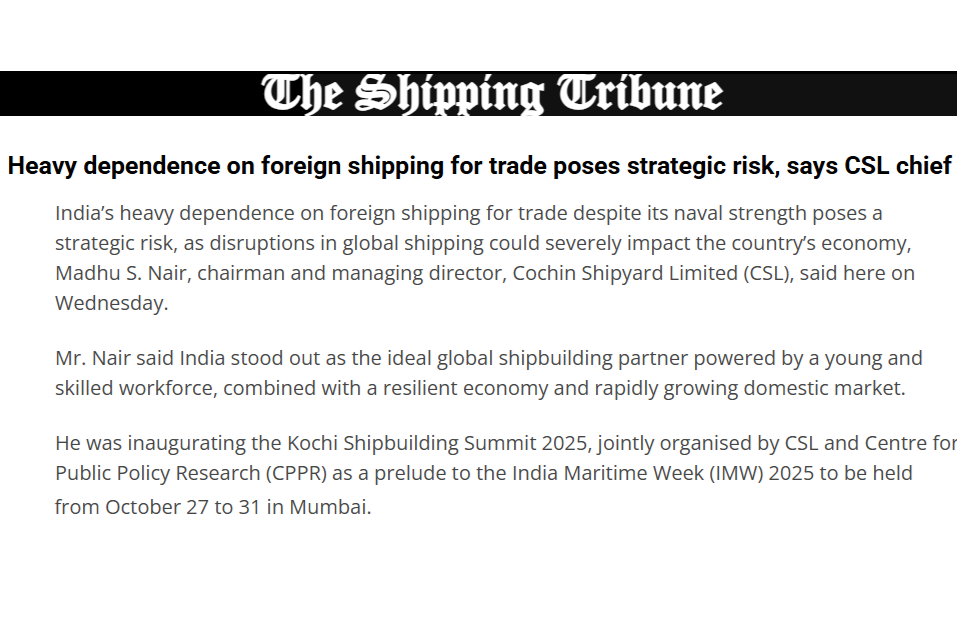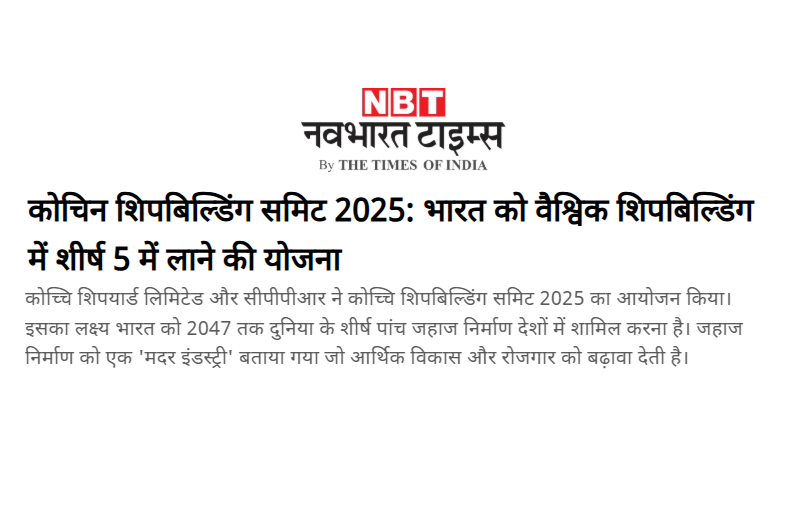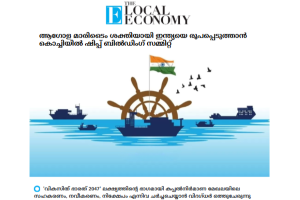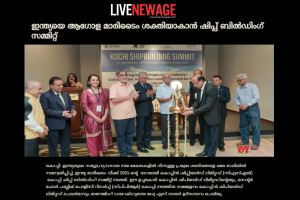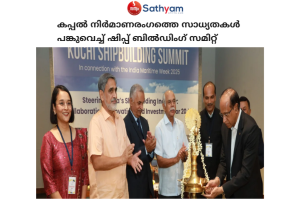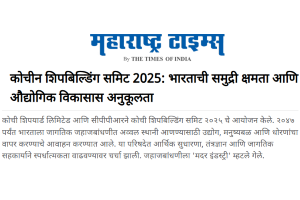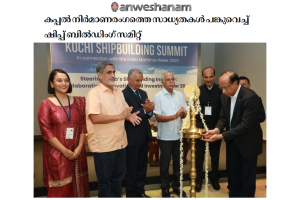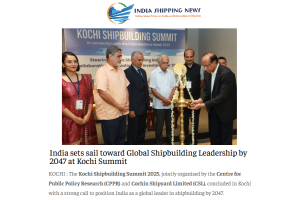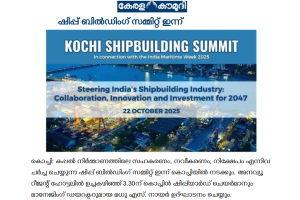Jointly organised by Centre for Public Policy Research (CPPR), Kochi, and Cochin Shipyard Ltd (CSL), Kochi
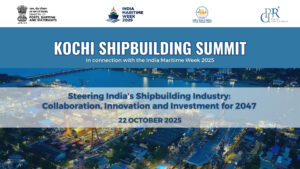
By-Invite-Only Event
Venue: The Regent Hall (7th Floor), The Avenue Regent, 39, 2026, Mahatma Gandhi Road, Jos Junction, Pallimukku, Kochi, Ernakulam, Kerala 682016
Kochi Shipbuilding Summit
Introduction
Maritime power has long defined the trajectory of great nations—shaping their prosperity, security, and influence in the global order. With its vast coastline, rich maritime heritage, and strategic location along major sea routes, India’s maritime sector is not merely an economic asset—it is a national imperative.
Under the vision of Viksit Bharat 2047, India aims to position itself among the top 10 maritime nations by 2030 and among the top 5 by 2047. This goal aligns with the country’s broader economic and demographic potential, as projections indicate that by 2070, India will account for 12% of the global GDP and host one-sixth of the world’s population.
Shipbuilding: The Mother Industry of Maritime Growth
Often described as the mother industry, shipbuilding has the potential to be transformative for India’s economic growth and strategic autonomy. It creates extensive employment opportunities, drives coastal development, and strengthens naval capability.
Today, the global shipbuilding sector is dominated by South Korea, Japan, and China, which collectively command a 93% market share. In this context, India’s young demographic dividend presents a unique opportunity to establish a competitive edge in shipbuilding and related industries.
However, realising this potential requires collaboration among policymakers, industry leaders, media, and civil society to cultivate a positive, informed, and realistic narrative for the sector’s future.
About the Kochi Shipbuilding Summit
The Kochi Shipbuilding Summit 2025, organised by Centre for Public Policy Research (CPPR) in collaboration with Cochin Shipyard Limited (CSL), served as a platform for meaningful dialogue and knowledge exchange on India’s shipbuilding and maritime future.
By convening experts, practitioners, and policymakers, the summit sought to:
-
Highlight opportunities and challenges in shipping and shipbuilding
-
Examine policy frameworks shaping India’s maritime growth
-
Chart a roadmap for strategic cooperation, innovation, and investment
The theme for deliberation at the summit was “Steering India’s Shipbuilding Industry: Collaboration, Innovation and Investment for 2047.”
Objectives
-
Assess India’s strategic priorities in advancing shipbuilding and shipping as drivers of economic growth and coastal development
-
Identify policy frameworks and institutional mechanisms to foster technological innovation, enhance competitiveness, and create employment
-
Pinpoint policy and regulatory reforms necessary to ensure financial sustainability and attract private and foreign investment into shipbuilding and maritime infrastructure
Event Theme
Steering India’s Shipbuilding Industry: Collaboration, Innovation, and Investment for 2047
Aligned with the vision of Aatmanirbhar Bharat, this summit focuses on expanding India’s shipbuilding capacity through:
-
Modernised infrastructure and mega shipbuilding clusters
-
Regional specialisation models inspired by global best practices
-
Strengthening domestic demand, technological capacity, and financial resilience
India’s aspiration to become a global maritime leader rests on four interconnected pillars:
-
Strengthening domestic shipbuilding capacity
-
Advancing technology and skills
-
Ensuring financial resilience
-
Enabling regulatory efficiency
Key Focus Areas
1. Technology, Skills, and Innovation
The summit will explore pathways for technology adoption, digitalisation, and skill development—empowering India’s workforce to manage advanced propulsion systems, design standards, and emerging green technologies.
2. Financial Resilience and Investment
India’s shipbuilding future hinges on sustained financing and incentives. Initiatives like the Shipbuilding Financial Assistance Scheme (₹24,736 crore till 2036) and the Maritime Development Fund (₹25,000 crore) aim to:
-
Lower borrowing costs.
-
Encourage private and foreign investment.
-
Create large-scale employment.
3. Policy and Regulatory Frameworks
Policy reforms, regulatory simplification, and multimodal logistics integration will be essential to enhance coastal trade, reduce costs, and promote sustainability in India’s maritime ecosystem.
Key Discussion Points
-
What challenges hinder the development of shipbuilding clusters, and how can global models guide India’s approach?
-
How can India close skill and R&D gaps to drive innovation and technological adoption?
-
How can schemes like the Shipbuilding Financial Assistance Scheme and Maritime Development Fund be leveraged to attract private and foreign investment?
-
How can multimodal integration and policy reforms strengthen coastal trade and logistics efficiency?
As India sets sail toward its Viksit Bharat 2047 vision, the Kochi Shipbuilding Summit underscored the importance of collaboration, innovation, and investment in steering the nation’s maritime and shipbuilding future.
Through sustained policy dialogue and strategic partnerships, India can harness its demographic strength, technological capabilities, and financial resilience to emerge as a global maritime power.
AGENDA
3.30 – 4:30 PM — Registration & High Tea
4.30 – 5.00 PM — Summit Opening
-
- Welcome Address by Dr D Dhanuraj, Founder-Chairman, Centre for Public Policy Research (CPPR), Kochi
- Keynote Address by Mr Madhu S Nair, Chairman & Managing Director, Cochin Shipyard Limited (CSL), Kochi
- Introduction of the Panel by Dr Dhritishree Bordalai, Senior Associate, International Relations, CPPR
5.00 – 6.00 PM — Panel Discussion – Steering India’s Shipbuilding Industry: Collaboration, Innovation and Investment for 2047
Moderator: Dr R P Pradhan, Professor, Dept. of Humanities & Social Sciences, BITS Pilani, KK Birla Goa Campus; and Distinguished Fellow, CPPR
Panellists:
-
- Vice Admiral G Ashok Kumar PVSM, AVSM, VSM (Retd), Former Vice Chief of Naval Staff; Former National Maritime Security Coordinator, India
- Mr Biju George, Director (Shipbuilding), Mazagon Dock Shipbuilders Limited (MDL)
- Mr Hariraj P, Chief Operating Officer, SEDS (Smart Engineering & Design Solutions Ltd)
- Dr Satheesh Babu P K, Associate Professor, Department of Naval Architecture and Shipbuilding, Cochin University of Science and Technology
6.00 – 6.15 PM — Vote of Thanks and Concluding Remarks – Dr Dhritishree Bordalai
GALLERY
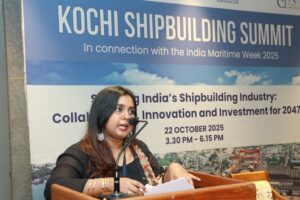
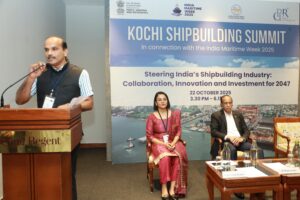
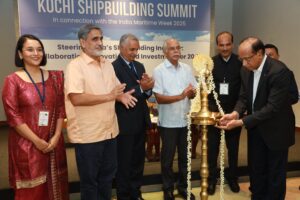
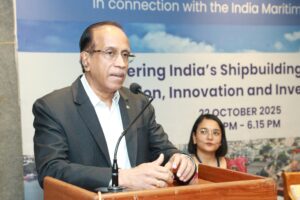
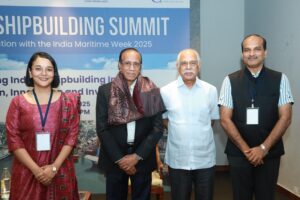
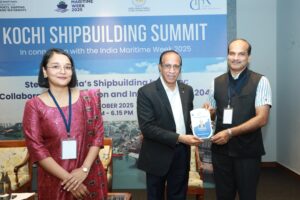
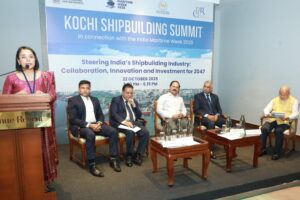
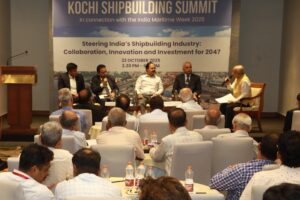

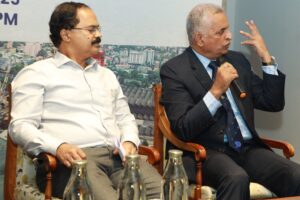
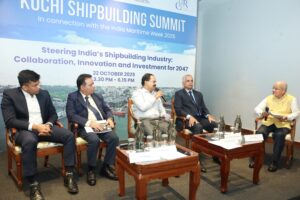
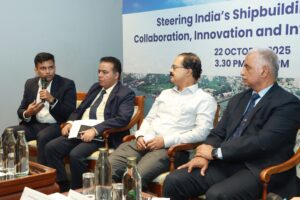
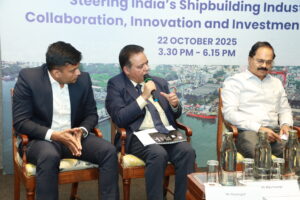

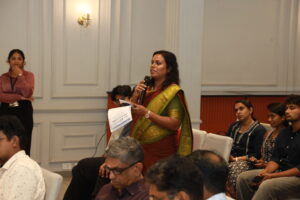
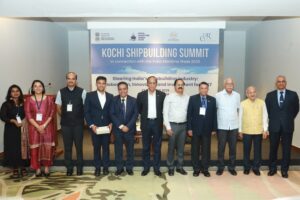
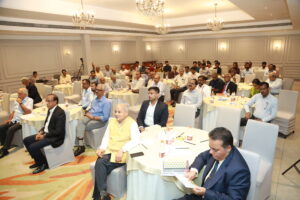
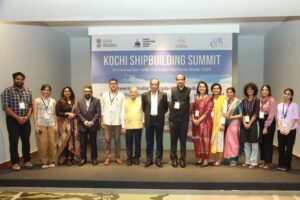
OP-EDS
IN THE NEWS



